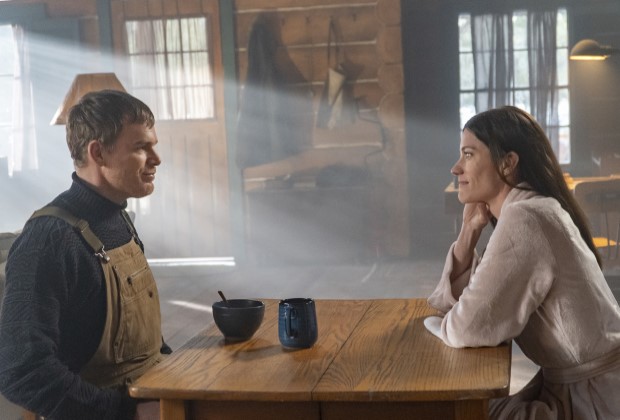RELATED STORIES
Dexter Morgan’s dark passenger had been dormant for nearly 10 years, but following Sunday’s Dexter: New Blood premiere, it’s safe to say his kill room has officially reopened for business.
While the former blood spatter analyst had created a peaceful life for himself under a fake alias, the return of his now-teenaged son Harrison, plus the added pressure from a smarmy, drug-abusing delinquent, sent Dexter’s dark side into a tailspin. He could no longer control himself, and by the end of the hour, he had claimed his first — and presumably not last — victim of the revival. (Click here for a full premiere recap.)
While we wouldn’t have a show without Dexter getting a little knife-happy, our antihero’s relapse was ultimately triggered by Matt Caldwell’s unbridled sense of entitlement and criminal behavior. Enabled by his wealthy family, Matt excessively pushed Dexter’s buttons. And after he killed a buck in Dexter’s own back yard (nearly shooting him, too, in the process), Dexter’s feelings of murderous rage finally erupted.
“[Matt] destroys this manifestation of Dexter’s aspiration of purity. He shoots this deer at a time when it’s the last thing Dexter has to hold on to,” Michael C. Hall tells TVLine. “He’s obviously been struggling with Matt and has felt tempted. I imagine when temptations like that have emerged in the past that maybe Dexter’s left town, that he’s moved on. But in this case he doesn’t.” (Hear what else Hall had to say about the series’ first kill in the video above.)
 Emotions were already running sky-high by the time Matt wound up on Dexter’s table. The night before the big kill, Dexter turned his son away, lying to the boy about his actual identity (when it was blatantly obvious Harrison knew the truth). While Dexter yearned to live a life where he could parent his estranged son (which, by episode’s end, he vowed to do), he had justifiable reason to initially reject him: It was the only way Dexter knew how to protect him, a decision strongly pushed by his dead sister Debra, who has now become the face of his inner conscience.
Emotions were already running sky-high by the time Matt wound up on Dexter’s table. The night before the big kill, Dexter turned his son away, lying to the boy about his actual identity (when it was blatantly obvious Harrison knew the truth). While Dexter yearned to live a life where he could parent his estranged son (which, by episode’s end, he vowed to do), he had justifiable reason to initially reject him: It was the only way Dexter knew how to protect him, a decision strongly pushed by his dead sister Debra, who has now become the face of his inner conscience.
“Deb expresses something that Dexter himself believes to be true: that everyone close to him dies,” says Hall, “[with] Deb being the most potent example. He made the decision to forsake his relationship with Harrison because he was convinced that if he stayed in Harrison’s life, Harrison would be destroyed like others have been. Dexter has played out this possibility in his mind and told himself that if Harrison shows up, the most responsible thing he can do for him is to turn him away. He does just that, but obviously he can’t bear it.”
With Jennifer Carpenter back as this alternative version of Deb, the dynamic between the brother/sister duo was both recognizable, yet oddly strange. But by keeping Debra “alive” (inside his mind, at least), it helped remind Dexter to stick to his routine, and at least try to stay on the straight and narrow.
“She’s not bound by who we know Deb to be,” adds Hall. “She’s an energy that’s embodied by Deb, but she isn’t bound by anything other than whatever emotional or psychological riptide is going on in Dexter’s own head.”





